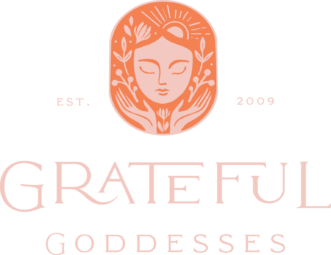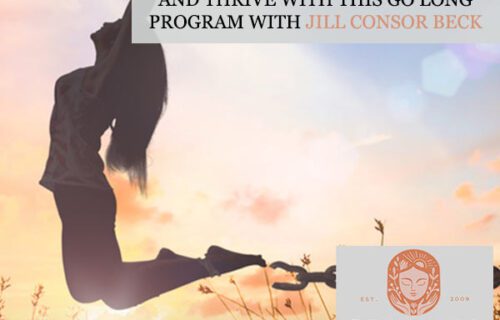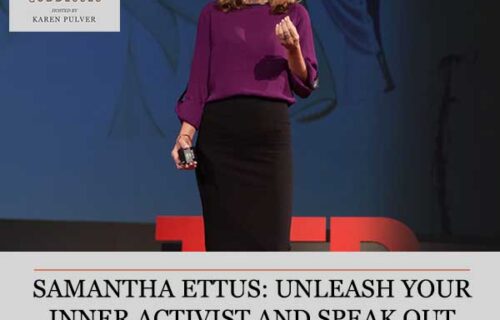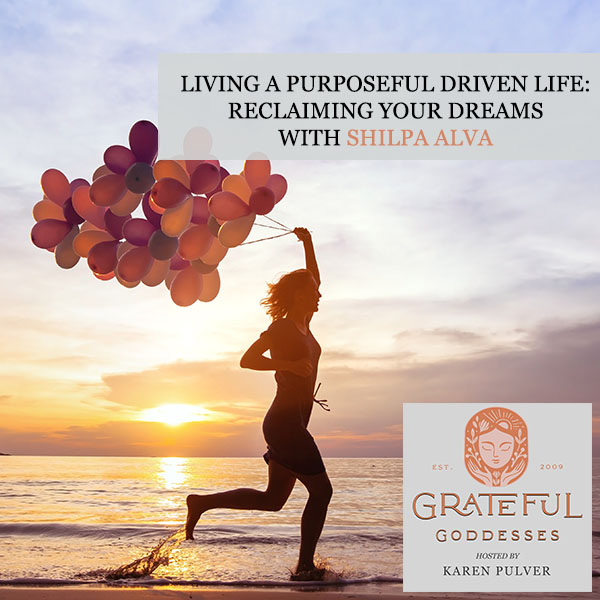
Living A Purposeful Driven Life: Reclaiming Your Dreams With Shilpa Alva
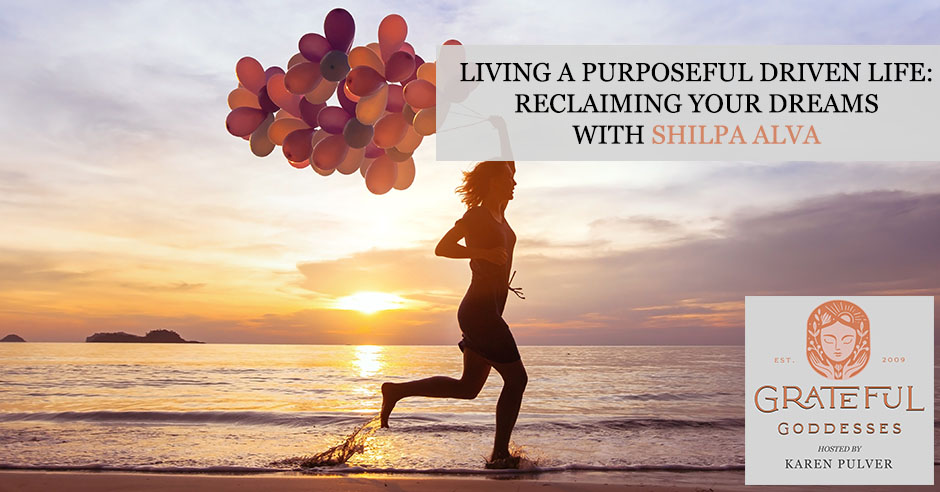
We all had dreams when we were young—dreams, wishes, and hopes of what and who we were going to be when we grew up. Then we grew up, and life happened. Some of us followed that dream, while some chose a different path, perhaps out of the necessity, however leaving that childhood dream backstage. Whichever track you went on, now is the time to discover the track which best aligns to help you live a purposeful driven life. Listen to this conversation between Karen Pulver, her featured goddesses, and Surge for Water founder, Shilpa Alva, as they talk about Shilpa’s dream, her journey, and her shift to hear her calling. Discover how you can remember the calling of when you were young and the ways to incorporate it into your daily life. See how Shilpa lives an authentic life of service and positivity to help others. Goddesses, join in on this journey today!
—
Watch the episode here
Listen to the podcast here
Living A Purposeful Driven Life: Reclaiming Your Dreams With Shilpa Alva
Find Your Calling
I’m glad that you’re all on this journey. I would like to introduce Shilpa Alva. Shilpa, how long have we known in each other?
It’s been for many years.
I met Shilpa when my husband and I were out with some friends. We went to dinner and they said, “We have this charity function to go to. We’re heading there.” My husband and I said, “We’ll come.” It was like the end of it, but we went and I was amazed. First of all, it was at a beautiful space. Not only that, but it was also cool because Jonathan Toews was there from the Blackhawks and he was supporting. Since then, we came home to tell our kids about it. There was a product that they were showing about filtration that we showed our daughter. From there, we took off being involved with Surge.
What I like to tell you about Shilpa is, she is a woman who is in true alignment with her purpose. She’s living a purposeful driven life. She’s found her calling. She is the Founder and Executive Director of Surge for Water, which is a Chicago-based nonprofit organization that has provided safe water and sanitation solutions to one million people in eleven countries. The spark that led Shilpa to the founding of Surge started when she was seven years old while she was visiting extended family in India. However, after graduating from Johns Hopkins University with a degree in Chemical Engineering, she joined the corporate world. From here, she enjoyed rapid early career success, earned her MBA and continued up the corporate ladder.
Eventually, Shilpa came to the hard realization that she was not living in true alignment with her purpose. This led to Surge’s eventual founding and to her leaving his successful career and secure lifestyle. This leap of faith has led to great things for her, both through the joy she experiences in her daily purpose-driven life and through the communities who benefit from Surge’s work every single day. I have seen that. In addition to her passion for safe water and global development, Shilpa loves to travel to new countries, read, practice, yoga, meditate, and my favorite is dance-off beat. Shilpa, there was something that struck me in your bio, when you came to the hard realization that you were not living in true alignment. Please tell us more about that story, that moment.
It wasn’t a single moment. It was a culmination of ignoring this calling for the longest time. When I look at my journey of first hearing this calling and understanding that I wanted to fight injustices, that was when I was seven years old. That’s when I understood that was an inequality in the world. I didn’t start Surge until my late twenties. It was a long period, like 21 years in between. I know I was a kid and a teenager on that process, but it was always there, this calling, this voice that was telling me that I had to do something more, which a lot of you already shared. We’ve all had these callings to do something in the service of others. For me, at some point, as I was going up the corporate ladder, I kept getting promoted, winning awards and getting to do these amazing international trips, these are things that someone in their twenties loves. This is amazing that you get to travel.
I’ve been to almost every Western and Northern European country through work and the Caribbean and South America. It was in this world that it was fun and fast-based and getting recognized for it. My ego was building and it was a busy life that I’m even surprised when I look back that somehow, I had those moments in between to self-reflect and evaluate like, “Is this the life I want to lead? What am I doing for the world? Have I forgotten that seven-year-old child who knew what right and wrong was?” I wasn’t doing wrong things, but I wasn’t serving the greater world in a way I knew I could and I had the passion for. It wasn’t a single moment. It was a journey and starting Surge was finally like, “I’m going to try something. I’m going to do something that responds to that initial calling.”
You had to give up a lot when you did that. I’m curious about that as well as our goddesses and in addition, if you had pushback or resistance from family or friends when you did that.
It was a long journey even in between. I started Surge in 2008 and I only left my corporate job in 2014. When we first met, Karen, I was still working full-time in management consulting and living this fast-paced life of traveling to Fortune 100 companies and still progressing on the corporate ladder. I was working full-time in a demanding job and then nights and weekends, I was running this organization. In 2012, I went to Haiti for the first time. That was the first country we started working in. When we first started Surge, we would partner with larger organizations and we would send them the money. That was my version of service, but we are no longer like that. We have a very different model.
When I first been in Haiti in 2012, there was no turning back off after that because when I saw what I could do if I put my skills into something like this full-time, I’m not seeing that anymore. Once you firsthand see the struggles and spending the time to learn and understand from communities, there was no way I was going to be able to do that with three weeks of vacation in the corporate world. It’s not possible. On that trip, I realized I had to quit, but I had no money. I was in my twenties, you just spend everything you have. I was making a lot of money so this is crazy that I had no money. I don’t have kids. I was completely privileged from not having debt, but I would still spend all the money I have.
You talked about having nice shoes and handbags.
If you’re living in alignment with your purpose, the entire universe will conspire to help you Share on XIt was all the designer clothes. I did what everybody around me did. If you make a lot of money that young and you don’t have obligations, you spend it at bars, at restaurants, on trips, on clothes, and jewelry. I did all of that, but when I realized that at that point I knew I was going to leave, then it was a journey towards that. I knew my family would freak out because as an Indian if you’re in the business world, you’re meant to be a CEO. If you’re not a doctor or a lawyer or an engineer, you’ve chosen the business spots and you go up there as far as you can. At the consulting firm, everyone was like, “You can be on the partner track.” I started to share this idea that I’m not staying. I’m leaving. My family and friends were the first to know and they went from initial shock to being like, “She’s serious. She was going to throw it at some point.” Some of my friends who heard about it for the longest time were like, “Quit already. You’ve been talking about this for so long.”
It was challenging because one, I’m not a US citizen. I’m an immigrant. I also had to make sure the visa stuff worked out well because from being an immigrant, you are connected to your employer. You can’t leave when you feel like leaving. I had to wait for my green card. There were practical things that I had to be smart about in the process. I figured out, who was going to be my allies? What’s that drive I need to build among my family, friends, and made sure they understood? My mom wants me to be comfortable that I had saved enough money when I left the corporate world and then I would be safe. I took that journey, but when you talk about giving up stuff, I moved out of my apartment and put everything in storage. I gave up Downtown Chicago rent. I was living in West Loop at that time. I stopped buying unnecessary things because I was living a minimalist life. You’re switching your practices and you realize that you don’t need a lot of money not even to survive but to live a normal life. I had support. I have places to stay and things and people who were behind me in whatever I did.
I remember watching your TED Talk and you were talking about giving up your handbag. As you said, you can live a minimalistic life and still be able to do some things. Alyssa had a question regarding something like that.
Shilpa, I can relate to your story up until that moment that you left and started this phenomenal nonprofit, Surge. I was in the world of corporate law, like management consulting. We both know these are not 9:00 to 5:00 jobs. They are all consuming. You mentioned, it’s normal to think about this other amazing thing in your life, but there’s not a lot of time. You’ve been on this treadmill and it’s such a stereotype. You get on this treadmill of year to year in advancement and moving up this corporate ladder. It’s true and that’s what happened to me too. I remember feeling like there was something more for me out there but also feeling disheartened in my world. My clients were wealthy private equity funders and investment bankers and I thought, “What am I doing here? I’m making rich people richer.” I wasn’t giving back to my community and feeling good about the work that I was doing.
I had the support of my husband who said, “This is not making you happy. You should leave.” The money keeps you strapped to that office chair. I also came from a family where they conveniently don’t remember saying, “You can do anything you want. Just be a doctor or a lawyer.” I don’t want to be a doctor so I went the law route. I had a tough time that first morning I woke up after I left my job after doing it for so many years, figuring out and thinking about my identity. Who was I if not this person that had this job that I had done for so long and this path that I had taken for so long? I remember feeling like, “What is my identity?” I was a mom and a wife, but on the career side, that was something I struggled with. I wonder if that was something you thought about as well. You had this amazing purpose, but I wonder if because you had done it for so long and there were family pressures as well, is that something that you thought about?
I did. I’m sure this was part of your experience as well. Those are my friends as well. That was my friends’ circle like, “What did I do every evening?” Every evening you were at the office and on Thursday, you’ll go to a bar and have happy hour. These are my circles. Your friends become your coworkers. There is such a thing that if you live a certain lifestyle, the people you gather around you and that lifestyle also are part of the corporate world. For me, the career part defined me because I was doing well in there. I was known in my career space at the company and other people around the industry. I was defined by that, but it helped to have a strong passion and that I was okay. Honestly, Alyssa, I feel like I don’t belong when I come back to Chicago.
That’s why in the time that it wasn’t COVID, I spend most of my year outside. I spend my time in the field countries because I feel like I belong there. I go to Bali a couple of months a year because it’s super cheap to live there and it’s amazing. I’m in the spiritual community, but I find it hard still over here. It’s changing because I’m starting to get introduced to more people who are more like-minded, but it’s weird because then you meet that person who’s like, “That’s amazing you did this.” I’m just a regular person. I’m like everyone else. I happen to follow my passion and not continue to be a slave to what I was doing. I have to check myself on this, but then I can’t help sometimes being judgmental of my friends, my circles of how they spend their money and time. I’m like, “There is so much poverty in the world. Do you need all these things?” That’s not right either.
I still struggle with that because it wasn’t the career. It was my whole life that was built around that career I had like how you were traveling, what you’re doing in a way you can afford to go, and what clothes you buy. It wasn’t me, but it was who I was in those circumstances. You think it’s yourself, but it’s not you and stripped away and like, “Who are you? Who is that? What’s that soul? Who’s that real person?” We’re human and we easily think that we’re connected to this. That flip side now, people sometimes use my name in Surge synonymously. I’m like, “No, we’re separate. This is my passion. I’m also recognizing and I questioned that and I evaluate it quite often like, “Is my identity Surge?”
I don’t want it to be, but often people meet me because that’s probably what I talk about the most. I’m passionate about the work, but I have many different facets of myself that most people don’t get to see. That becomes your new identity. You switch from one to the other. It’s still a constant thing and I think with any of this, what’s helped me the most is deep meditation practices and things like that way. Once you know who you are from the deepest level, at a soul level, then that’s all that matters. It’s easier said and this is a continued practice, but that is what helped me identify like, “I’m me, and Surge is something I happened to do that I’m passionate about.”
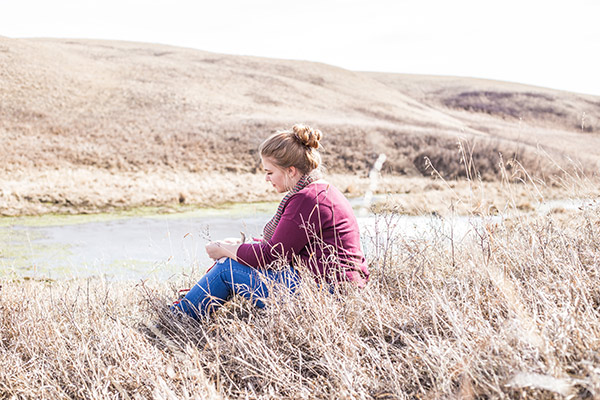
I love your journey and I’ve been studying with this woman Rama in the suburbs. Everything that you’re talking about like your soul and meditating, understanding who you are and what your passion is. I keep thinking though, it’s not bad that your synonymous was Surge. You’re synonymous with this fabulous organization that you birthed and you’re doing so much good. I think you could talk to me and I’ll tell you I was a PTA President. I’m still attached to that identity and because I’m struggling with what’s going to fill that part of me. Even the fact that I don’t work and even as proud as I am and I feel thankful I could do that work, I still struggle that I don’t earn an income and I’m not contributing to my family in that way. I don’t know this but are you single? Did you do this completely on your own? You don’t have someone else supporting you except for your family, your friends, all the love and everything? You took this completely on your own and that is so brave and amazing.
I am single and I did take it on my own. Sometimes I listen to top executives, men or women. They talk about how they had a partner in life and that’s how they get through the hard days. I am like, “How much further would I be if I had that constant partner.” I recognize that, but it hasn’t been a limitation. A part of it is because of the lifestyle I lead. It’s also hard to be in a relationship that can last because you’re always moving. From a fear perspective, Rachel, I want to share that when I finally left the corporate world and I was talking and resigning to the partner at the consulting firm, he was like, “How do you feel?”
I tried to resign multiple times and every time I tried to resign, they’re like, “Work from home.” They kept giving me everything to keep me because they didn’t want to lose me, such as increasing salaries. He knew I was resigning and there was no way I was taking any offer. He asked me how I felt and I said, “I was afraid because I didn’t know what I was getting myself into.” I felt it was jumping off but it’s like I had created a landing pad because I was preparing for it, but you’re still jumping off that cliff and you hope that landing pad can catch you. He said, “The fear in our heads is always less than we make it out to be. Remember that. I know you’re afraid, but what you’re doing is not that scary.” You’re always like, “This is the scariest thing I’m going to do, but when you do it, it’s not.”
We build things and fear up to be something big and when you do it, sometimes it is not that bad. It hasn’t been scary while I’ve been doing it. There are moments, but it’s been cool to sit with that uncomfortableness, with that fear sometimes, and with that uncertainty. There are benefits to that and excitement around it too. There’s creativity that can come out and other things that when you’re in a comfortable spot, you don’t create. Sometimes you don’t want to stretch yourselves. Those are the benefits of addressing that fear.
I was intrigued by something that you said and I misunderstood it, certainly. It takes me back with racism and white privilege. When you left Corporate America, you didn’t want to judge your friends for continuing to overspend or feel righteous in what you were doing. That’s an important distinction in conversation because sometimes pushing yourself to say something that might be uncomfortable reaps a lot of benefits. I asked you with your experience of not the blueprint, but how do you have that? Do you just be candid to say like, “Surely, you could donate somewhere that’s a passion and it’s a small amount. You may not be doing it for Surge, but let’s be realistic.” Maybe a small percentage is going to be like, “Screw you. I’m living the high life. That’s what I’m doing and that’s what’s going to happen.” I heard you say in a nice way like, “I don’t want to portray myself as this righteous person doing all this good and these people are irrelevant because all they’re doing is spending and making more money.” I wanted you to speak to a little bit of that balance.
It’s something that I still am trying to figure out. For me, if you go back and live the example. Hopefully, you inspire people to the example of the life you’re living and I’ve seen that happen in my closest friends and circles. When I talk about the work and I speak about it passionately, I’ve inspired people to give up corporate jobs and follow their passions, have people join the nonprofit world, or give more than they would have before. I see that happening by being friends with someone and continuing to be authentic to myself and living in the way like I want to live. There’ll be moments that we were joking about the design of bags that I don’t buy anymore, but I still carry a bag that’s old and it’s like, “I probably shouldn’t be carrying anymore. It’s probably falling apart.” People will comment like, “You need a new bag. You need a new thing.” Those are the things that I’m like, “I don’t need it because it’s functioning.”
My family members will be embarrassed sometimes with things that I’m carrying or wearing because we’re part of a subtle level of society that you dress a certain way and you do certain things. I’ll get gifts from people like, “Here’s something. I only decided I don’t want to spend my money that way. Those are ways that I’ve been trying to influence it, but maybe I need to address it more upfront. I haven’t thought about it in that way. If anything, that’s food for thought of like, “How can I be part of moving someone faster along in that journey?” I’ve been doing it passively in terms of I’m living the life I’m living versus instigating that movement.
A lot of people have heard their calling but have refused to hear it. Share on XFor me, it’s comfortable to be passive. That’s where I’m looking myself to be a little bit more forward. Even if the question is maybe inappropriate, I don’t say the right language, or it does sound righteous, then I can learn and grow. I don’t get to have those conversations in my life. I’m looking to have them now with the world so your experience has been helpful.
When I came home from that event, they had a product called LifeStraw, which is a portable straw filtration system that you could go to a pond, drink from the straw and it would filter the water. It was mind-blowing that there was something like that that could be given to people to use in a place where they could not have access to clean water easily. We had one. We brought it home and we showed it to our kids and right away was like, “How can we get these to people?” We discussed it as a family.
She developed to make up a project called Skylights where she made candles and she sold. It was a long time ago, but she ended up raising a couple of $1,000 towards Surge. That was how we started. From there, we’re learning more, asking Shilpa to go to events and then the Menstruation Event where my daughter got involved and then donating. We almost had a trip to Haiti, but it didn’t work out. Doing those little things in addition to donating helped our family. Shilpa, you never asked us. You never said, “Can you come to do this?” It was showing us what it was and then we took on to do it. For example, the Menstruation Sisterhood Project that if you want to talk a little bit about, you had a lot of people this time, especially because it was on Zoom. It started small and it got bigger. The same with Surge and your events. I remember that fundraiser, how many people were in the first one?
Less than 100, probably.
How many were at the last one?
Over 500.
Can you talk a little bit more about Surge and some of the other things that you do?
One of our taglines is The Ripple Effect. What you’re describing is to read the ripple effect like everybody has the ability to do something and then that has a cascading impact. When we first started in Chicago, we had to beg people to come. You happened to know a common friend of mine, which is how you got that, Karen, but everybody else was like, “Please come.” My sister lived here at the time and I didn’t even live in Chicago. It was all her friends. When we look at the environment we have, it’s amazing. We are able to gather all these people. It sounds like everyone here has had involvement in nonprofits and the culture of Surge, the values that we hold, we feel like you’re a part of a family. When people come into our events, it’s different from large organizations. You do get that close-knit feeling because it is organized by predominantly volunteers.
I think that’s one piece of there’s something in it that’s special and calls people and you can have an amazing impact in whatever way you’re able to put in. The work that Surge does, we do all of this to provide water, sanitation, hygiene and menstrual health to impoverish vulnerable communities around the world. You’re looking at anything like wells, rainwater harvest stands, water filtration units, building toilet and handwashing stations. We realized that as we were working in all these communities, the girls would be dropping out of school because they didn’t have access to menstrual products or their bathrooms are horrible like no doors, almost falling apart or falling down, and they are sharing with boys.
Every month, when they have their cycles, they don’t have anywhere. They don’t have the products and a place to go. We’re like, “We do the water and toilets.” That helps the girls, but we were like, “We need to go further with this.” We started teaching the girls how to make reusable pads. At least, they have something because they don’t have the money to go buy disposable stuff. That’s been valuable and has been transformational in the community. More than that, we took them to this beautiful event that’s all about empowerment, strength and the fact that they’re able and strong. They would understand what the taboos on the social restrictions in their communities and how can they break that as a sisterhood.
We do this in the field countries. We work in Uganda, Haiti, the Dominican Republic and the Philippines. Years ago, we decided, “Why don’t we do that here in Chicago because we need to have these conversations here as well?” There are these taboos around menstruation here in the US. Fifty percent of women in the US had a period-shame in their lives. There’s been a homelessness issue here, where women don’t have period products. Karen, you’ve been at all of them. When we piloted it, we were twenty people. In 2019, we probably had about 50. In 2020, we were able to do it across different time zones with our Dubai team as well so over 100 people probably showed up between both of them, people from Uganda, France and Holland. That was super cool as well. We did the same thing, empowering women to stand together as sisters to help the most vulnerable amongst us and understand that our cycles are so much more than something unhygienic and dirty.
As goddesses, how can we contribute not just financially? What are some things that we could do?
A big part of any of this when we talk about what’s happening in the country with racism and racial injustices, I always think that the first thing is to help raise awareness. Do people even realize it? Living in Chicago, this happens to me all the time and people still don’t understand that there’s this global water shortage, that two billion people don’t have water in their homes. Over three billion people don’t have a way to wash their hands, and 4.5 billion don’t have a toilet. People don’t even realize that this is a devastating global issue. How can we live with such injustice in the world? How can we be okay with this? I think that’s the big thing of even being that ambassador of like, “This is a big issue here,” and the whole menstrual health conversation. Awareness is a big thing. I invite all of you to come with us to the field when we can travel again. We don’t know when that will be but come to Uganda, Haiti and the Philippines, whether it’s you or if you have children, get your children involved. They can come with us.
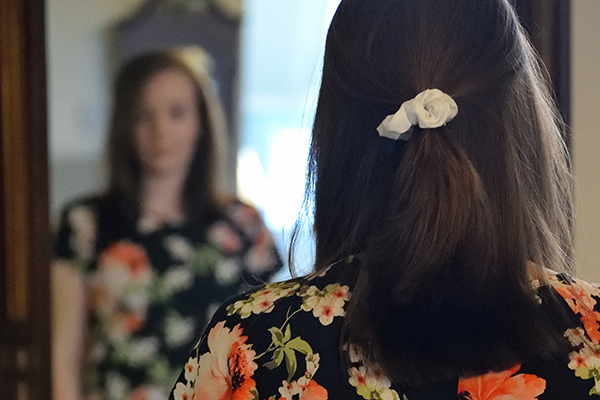
That’s quite significant to be better to have a lot of youth, college, and high school children come and they’ve been impacted for life. Adults have been impacted too because seeing the poverty, we’ve worked in this remote village in Uganda. It’s mud huts, no electricity and everything’s off-grid. It’s mind-blowing. Sting is the other way. We are in the US and if you want direct ways to help here, look at what your local shelters need, what menstrual health products because apparently, hygiene products, especially feminine hygiene products, are almost never thought of and never donated. We partner with a local organization here because that’s not a core mission as global work, but we can always facilitate those kinds of things. People always want to get products. Hygiene products for women is a big way of helping as well. There are a lot of smart women at this session. We are mostly predominantly volunteer-run, so there was always a need for skills. Even the broad network was reading this, the board members, volunteer board, advisory board, a governing board and an associate board. There’s leadership. There are two that we work with. There are quite a few that are coming up. The one on our call was The Period Collective, but we’ve done work with The Chicago Period Project as well. These are great orgs that might be a future person that you might want to talk to.
As a group, you might have some great insights about this, exploring how we find our purpose. For you, it was clear at a very young age. You thought poverty and the injustice in the world. You knew all along that this issue of having accessible clean water was something you were passionate about and you were able to translate that passion into your life’s work. For many of us, there are times in our life when passion and purpose are less clear. This group may be a perfect example of that, where we’re finding ourselves at a transitional time where we’re empty nesters or kids are grown and less dependent on us for everything.
Raising your kids becomes less all-consuming and we’re looking out into the world saying, “What else can we do? How can I give back? How can I find self-fulfillment? Also, how can I be that citizen of the world that’s going to do some good in the world as we’re aging?” I’m trying to personally explore finding new passions. In many cases, they’re not light bulbs that go off one day as you’re sitting and drinking your coffee. It takes time. I wanted to put out to the group, at this point in our lives, we’re of a similar age. How do we find these new passions? What do we do?
I read this book that was revolutionary for me. It was called Women Who Run With Wolves by Clarissa Pinkola Estés. It’s phenomenal. It’s a hard book to read because it’s super big and tiny font. It triggered me in a way. She talks about the fact that as women, we are born to be creative. We are creative souls, but what happens is you get into these lives. Even with me with Surge, you’re getting, doing and you’re busy if you have kids. If you don’t have kids, you’re looking and always mothering in some way, whether it’s physical kids or not. It’s so much. We don’t tune-in and we don’t create that space for that creativity. If you don’t, then you don’t hear your soul.
It is like, “How do you create these environments to listen to that soul so that you at least give an opportunity for that passion to come out?” One of the things that she talks about in that book is, “What are your creative outlets?” When you put yourself in those creative environments, that’s probably the closest. You can do things like meditation and yoga, but creativity is the other way to start opening it up, and channeling ideas that will come that you didn’t even know are always there. I always recommend it to people. Even looking up the quotes, it’s beautiful and it makes so much sense. That’s a tool to channel something deeper within.
Do you feel much in the flow?
Yes. There are times when I’m like, “Nothing can stop me. I’m on fire. This is a breakthrough and I’m living the most amazing life in terms of living on purpose.” When you have an idea that the goal is unachievable and people come on and they want to help because everyone wants to be part of that energy. Most of the time, yes. I also have low moments. COVID messed up our community and funding. You’re like, “Where are we? Everything was going so well. Let’s regroup. How do we respond in this time?” That’s been shocking for everyone in different ways and it’s impacted the places we work in regarding our funding as an org.
I believe that because if you’re living in alignment with your purpose, the entire universe will conspire to help you. I think it was Paulo Coelho who said that. Putting that positive energy constantly out there and Alyssa, one more thing to what you comment on. I think that a lot of people have heard their calling but refuse to listen to it. You said earlier that you’re dependent on a paycheck for money you don’t even need it. You’re already working in this wheel and that’s most of society because you’re in a house that you don’t need. There are so many things. We can keep going and that’s a whole conversation. You know what you want to do a lot of times, not always and then we don’t listen to it.
Shilpa, I am wondering how the pandemic is affecting the work you do. I know that you can’t travel to all of these countries and that’s a big part of the work. I know you spend most of your life traveling. What are the ways that has affected Surge?
The fear is in our heads. It always is less than we make it out to be. Share on XThe way the Surge’s model works is that the work continuous regardless of whether people from outside, including my self-travel work because we believe as far as our model and empowering locals. In every country we work in, we had a local partner that we’ve hired. We pay all their salaries and they are running the programs regardless. This time has proven once again that creating models that are truly sustainable is critical because it’s been able to withstand that part of the pandemic. The part that’s been hard, three billion people lack the ability to wash their hands at home. As we all know, washing hands with soap is the most effective way to stop the spread. How do you wash your hands with no water and no soap? That’s one of the first ways that our communities have been impacted to the point our health centers in Kaberamaido, Uganda did not have facilities for patients to wash their hands in health centers. There are twelve health centers there, one in South County and they did not have that.
The first thing that we did was make sure that we set them up in every health center with soap. This becomes interesting because our org focuses more on infrastructure and education. We don’t do as many consumable solutions because we believe in sustainable things like, “How do you teach a man to fish so that they have fish for life?” It is the same concept. We don’t typically go give soap or bags. We teach people how to do it and then it continues well beyond us. The same thing with soap, what we did is we ramped up our soap making classes, both in Haiti and Uganda, so people can make their own products. They’re happy about it. Even the head of one of the hospitals was like, “One was enough from the national stores if we don’t have enough soap, but now, we can make enough soap for our hospital. I’m going to teach my family and our neighbors. We are all going to have soap.”
We taught the people in the markets how to do it and they were like, “We can’t wait to start selling this product.” That’s beautiful. It’s going to be something that lasts way beyond COVID, so we’re continuing to make sure that there are water and hygiene access. We can’t go door to door to people anymore. A lot of our interventions required our teams to go into the communities and educating because of COVID. Haiti was in a lockdown and you couldn’t gather in groups of more than ten in Uganda. In both Haiti and Uganda, we set up radio shows. We’ve used this in the past, but we brought them back. In Haiti and Uganda, it’s a two-hour radio talk show and it’s amazing.
Every week, they call on different speakers and the topic last time was why to use the committees. The one before that was menstrual health. They keep going and they call in a village leader, a beneficiary, some who’s benefited from my solution. People call in from the villages and ask questions. The one in Haiti, I found out has a potential of 100,000 people who listened to the show and that happens every Tuesday morning. Other creative ways that we are making sure that our message is still out in a new innovative way. This is related to water, but if you want to know about the broad issue of COVID, it’s been devastating because of the fact that you’re looking at all our countries, a large part of the workforce is in the informal labor market, which means they’re working in agriculture. They’re in markets and transport, so they don’t have salaries.
When you have a country that goes on lockdown, it cut off the entire income. People who are farming have nowhere to go sell their goods so our villages are telling us things like they’re afraid of starvation. These are devastating things. We have small health centers in our district, but women can’t get to the ferry to go to the big hospital because the ferry is no longer working. Women who are giving birth are dying because they can’t get to a bigger hospital. These farmers don’t have seeds because they can’t go to the nearest town to buy the seeds. These are many more and I can keep going with that.
There are other implications of the lockdowns and what that has in terms of transportation and how their lives depend on having a country open. When we talk about our mission, yes, we provide water, sanitation, hygiene, but we always say that we do that with the goal of addressing the cycle of poverty. At least we’re taking care of the hygiene piece, but we can’t take care of everything else I mentioned. That’s the reality of what’s happening and that’s a couple of examples of what’s going to happen in this world, so we all need to be paying close attention to how we can understand, become aware of the issues and how we can help in whatever way.
It puts so much into perspective.

There is another positive part of it. We’d work in a very remote area so a lot of the husbands work in the town, which is nine hours away. They see their husbands 2 or 3 times a year maybe. They all had to come home. At least the families can all be together. They shared some of those things that when they can get seeds and they have more labor. The kids are home so they can work on the farm. I don’t know if that’s good or bad, but they think it’s a good thing. There’ve been some things that they were joking. There was one woman in our community, a teen, and was like, “Many kids don’t even know who their dads were, and now they know because they can be home.” There are pluses and minuses, but I’ll leave you with that. I read an article that said that 40 million people are going to step back into levels of extreme poverty by the end of this pandemic. Those were progressions we made in the last years and we’re going to revive and go back to 2017 levels of extreme poverty.
I think it’s amazing how even during this pandemic, you’ve been able to pivot and give them the skills like making the soap. You are culturally changing things across the board, with your radio station, and the creativity to think of the media that they use and how you can affect that media. You’re such creative solutions that are wide-reaching. A community, the soap and then the far-reaching aspects of how many people are listening to that radio show, you are changing the culture across the board. It’s amazing.
That’s why I love her so much and her passion and energy. It’s interesting because for me, I’m trying this new venture. It feels right. It feels good. I know that I like teaching and people have said to me, “You’re like the glue. You bring people together.” I started thinking about all the people that I’ve met and that’s who I’ve brought on as guests. I’m hoping to attract more. Even Shilpa, you’ve connected me to some more people, which I cannot wait to have on the show. It could be something else that pops up but doing what feels right. I do have a question though. You mentioned about children, whether we have them or not, but maybe this might be a roadblock that I’m putting forth. For some of us, we have children and maybe they’ve gone on and we’re empty nesters, but we still feel like we have to help and support a little bit. That might interfere with doing something for ourselves. I don’t know if any of you feel that way or not, especially just the child-rearing years where we had to put things on hold, whether it be staying home or working to support our family. I know you don’t have kids, but do you think you can do both?
Marita, who was on our sisterhood event, she’s a mom of two young girls. She is the perfect example of someone who is doing both. She believes in this whole thing of the most important education you can give your child is living in alignment with your passion and purpose. That’s amazing for a child to see and be part of. You almost have to do both if you want to raise the next generation of thoughtful, kind children. Do you want children to learn that this is life? I understand that it’s a privileged conversation the way I’m saying it because there are bills that need to be paid. There are situations where people cannot because they there’s no way because they need food, but if you have the privilege, then that can be used to make sure that somehow in some way, maybe it doesn’t have to be all the way, but what are those things we’re doing?
Also, doing little things on the side to get started. If our readers want to contact you or get involved, how can they do that?
You go to our website, SurgeForWater.org. My email’s there at Shilpa.Alva@SearchForWater.org. It would be the other way to email me directly.
—
Welcome to Favorite Things for our featured goddesses, as well as our guest goddess, Shilpa Alva. These are things that bring us joy. It doesn’t have to be a physical object. It can be something that you’ve heard, you like to wear, a color, anything. How about we start with Shilpa? What did you bring?
I brought pendants. There’s a bunch of them and I have even more. When I first went to Haiti, I got close to one of our field partners, him and his wife. They both happened to be artists. I started staying with them on my trips. I would stay in their home. They are amazing Haitian couples, super artistic. Their house would have tons of artists from Haiti coming through and it gives you a different perspective of what this rich art culture that exists beyond the poverty where we used to see. She makes jewelry. Every one of these all represent different trips. Every trip, she’d always have these boxes of stones and she would ask me, “How are you feeling on this trip? What are you channeling?” I would be like, “I feel uncomfortable.”
She would go pick out the stone that would be responding to how I feel. This one is tourmaline and this wards off evil and it has smoky quartz. That is something that is similar to grounds you. Everyone represents my feelings on that trip. She would make these for me, hand-make them. There’s no electricity and then she was sitting there and hand-made these. I’m not even into jewelry, but this is the kind of jewelry that has meaning that I continue to hold onto because it’s precious and they’ll send me precious stones.
I have it all written because I have a box of stones here. Smoky quartz is healing.
That makes sense. She was warding off evil and then healing. That was probably what I was feeling on that trip. Maybe you can tell me because I never wrote it down for each of them. I know one of these stones is magic. She was trying to bring magic into my life. This is quartz, it was intuition and copper. She put quartz and copper together in one of them.
To sit with that fear is sometimes to sit with the uncomfortable and uncertainty. Share on XThey do all have meanings. I also like stones and I like to hold them. They have the power within them. Rachel, what did you bring to share?
This is what I hold all the time. It’s a Rose quartz. It’s for love and I love the shape of it. It’s smooth and I always keep it on my desk. I hold it and I have the other stones that I hold if I’m looking for energy. What I meant to talk about is my RDG and I even wore this necklace. My mom made this necklace and it’s a volcanic rock and you can put essential oils in it. It’s healing and cooling. As Dena referenced, I feel like I have woken up and as liberal, left-leaning and conscious as I think I am. I feel like I am part of the problem and I am doing a ton of inner reflection. I want to have conversations as well. We can’t change our lens like I a, a white woman of privilege, and mother. We all have all these different labels and identities, but it is our lens. I don’t think we need to apologize for our lens, but we need to use, widen our lens and see the lens of others as much as we think that we are. All the walls have come down for me and I am in a period of self-exploration. My son gave me this for Mother’s Day. When the documentary was out, I made them go with me. I’d seen it once and I was like, “This is what I want for Mother’s Day is for you boys to come with me.” I am trying to channel her at this moment in life.
Dena, how about you?
To start, I’ll piggyback a little bit with Rachel. What gives me a lot of peace is I truly believe that our kids are already far ahead of us in what their purpose is and what they fight for, which brings me to what I brought. I was the only one in the house up until we would buy cases of plastic water bottles. I was the only one allowed to drink them. I have half-empty bottles around my house that made me crazy so wasteful, but it’s what I used. I didn’t like any of the other recyclable, reusable water bottles. I didn’t like the stride, the size and the taste. I hated them. They all obliged me for a while.
My eldest daughter finally said, “Mom, this isn’t good for the environment. You need to stop using these bottles.” I said, “It’s the size, the top and everything.” She found me on Amazon. This is the same size as those plastic water bottles, but it’s reusable and washable. You take it apart so you can have almost a wider mouth to drink, fill up or put ice in to keep it cold and everything. It all goes into the dishwasher and is used. These are mine. No one’s allowed to have these. I circulate them through the dishwasher, but it makes me feel purposeful. It makes me feel like I’m doing good. I’m glad that my daughter had the wherewithal to say enough and push me forward.
What is that called?
It’s COPCO. I got them on Amazon. I have a great one. The bands are different colors and it is life-changing for me.
Shilpa, have you seen those?
I have not seen those. I’m going to be like, “Here’s my Surge water bottle.” I have a water organization, so it’s clean. When we are in the field and stuff, we insist that everyone brings their own water bottles. We don’t have plastic water bottles at any event, anything like that. Sometimes we have guests where they’ll break the rules and I’m like, “You can’t be in the picture with that.” We can’t even be seen holding a plastic water bottle.
My daughter was mortified. She was like, “You’re so far behind. It’s enough.” I was like, “She’s right.”
You should be proud of yourself for making the change because that’s all we need. That’s a perfect example of being so comfortable with something and then changing too.
I want one of those. I also hate seeing the half when you’re out and stuff at picnics. We have the Surge one that we use as well as a few other reusables. How about Alyssa?
Before I jump to my favorite thing, it’s been disheartening to see how COVID has set us back in many ways on using recyclable products and not using straws. In an effort for everyone to keep their distance and not touch too many things in the grocery stores now. They can’t hold food. It doesn’t let you bring in your bags anymore. They keep putting my groceries in paper bags and I have all of these bags sitting in my trunk and they won’t let me bring them in. In planes, I know they serve cans of water with a straw so that you can put it under your mask and drink the water. Why everyone doesn’t bring their own reusable water bottle and straw? I digress a bit and it’s been unfortunate to see how this pandemic has affected our inability to be as conscious about environmentally safe products.
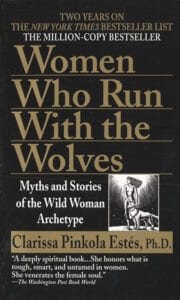
I was thinking a lot about purpose and identity. Rachel, you mentioned how you see the world through our lens. I see a lot of my identity and a lot of how I see the world in most cases. It’s how you were brought up, but in particular, my grandparents had a tremendous amount of influence on my life and how I see the world and what I have and being grateful for what I have. I keep it on a bulletin board close to where I sit every day is this photo. It’s an old photo and it’s from my grandparents’ wedding. The people getting married are my grandparents and they were surrounded by brothers, sisters and parents. I was named after my great grandmother. This is the back of an invitation to a family reunion, but I use this photo. I didn’t have the photo, but this is what I use.
All of those people in that photo except for the little girl were born in various parts of Europe, Poland, Russia and came to this country as young children with nothing. My grandfather, my mom’s dad had maybe a grade school education but nothing further. When you talk about the American dream, he was going to come to this country with maybe a dollar total to his name and work his way up to a job and being able to find a way to be educated and raised family. My grandfather worked his way up through this world of printing with these newspapers. He was able to put himself through night school to get a high school diploma and ultimately, bought a company and that was his livelihood. In doing that, he was able to support his family, my mom and my aunt. He was a patriarch in our family. The values that were important to him got passed down to my generation. I hope I’m passing them onto my kids, but most importantly, he stood for getting the best education you can afford to get. It might not be in such a linear path, but in your own life, you can find ways to learn, grow, and get an education to work hard as he did for many years with very little, but working hard to be able to support his family.
He was about family. Family came first no matter what and always making that his priority and giving back to the world when he ultimately could. He always donated anonymously. He always said he never wanted his name attached to any money that he gave. That was how he did it, but he was philanthropic to the causes that he believed in. It’s a great American story. I think about him and his journey, which was hard for a long time. It’s pushed me in my own life to try and do the best I can to live up to the standards that he sets for all of us. I have this picture and I’d look at it all the time. It’s a real big part of my identity and who I am.
I agree that photographs are important to have as a visual reminder of how we can live in this world, what our values are, and what we can do moving forward to inspire us. Along those lines, although it’s not a photograph, as a preschool teacher, I try not just to teach the kids how to share and how to cooperate, but to look inside themselves. Without them even realizing by reading books like this, Dr. Wayne Dyer’s, Incredible You!, this is one of my favorite ones, seeing all the things that you’re possible to do. I Think, I Am!, the things that you can do to powerful affirmations. One of my favorite ones is based on The Little Engine That Could, but it’s a modern version, I Knew You Could!
I’m not going to read the whole story, but I did tap off some. I play preschool teacher to you, but I love it because we’re talking about our passion and being on the right track. “First of all, you must find your own tracks. You can start right away and not be held back, but which track is yours? That all depends on which way it’s going and where it might end. Different tracks, wind around, over, under, and through, so pick out the one that works best for you.” That’s like finding your passion, try it, leap, and go forward.
This is interesting because a lot of times, we, as adults, find something that we might want to try, like what Shilpa said, you said there was some reaction, some pushback and maybe thinking, “I should be doing this or that.” “The plane might wish that he could get out of the air saying, ‘I wish I could travel like the train down there. The cars will watch as you speed right along and they’ll say to each other, ‘Look how fast and so strong.’ Don’t worry about not being a car or a plane. Enjoy the trip that you’ll take as a train. Be happy who you are and then try to remember that the world is wide full of all kinds of people with their own trains to ride. Stay true to yourself as you travel your track with no second-guessing and no looking back, which is hard to do because we always ruminate, “Did I do the right thing? I don’t know if I’m on the right track.” There’s more about life that you’ll learn as you go because figuring things out on your own helps you grow, trust in yourself and you’ll climb every hill and say, “I think I can.” You will.” It’s true, we instill these things in our children and we continue their passions of things. When you were seven, Shilpa, or when I was younger too, like wanting to help kids, it’s important to tap back into that track, to be on that track, and not be diverted by planes and cars. You’ll be happy being that train on that track. That’s one of my favorite things are these books. Thank you so much, everyone, for sharing your favorite things on the show.
Important Links
- Surge for Water
- The Period Collective
- The Chicago Period Project
- Women Who Run With Wolves
- SurgeForWater.org
- Shilpa.Alva@SearchForWater.org
- COPCO
- Incredible You!
- I Think, I Am!
- The Little Engine That Could
- I Knew You Could!
About Shilpa Alva
 Shilpa Alva is the Founder and Executive Director of Surge for Water, a Chicago based nonprofit organization that has provided safe water and sanitation solutions to 1 million people in 11 countries. The spark that led Shilpa to the founding of Surge, started when she was just 7 years old, while visiting extended family in India. However, after graduating from Johns Hopkins University with a degree in Chemical Engineering, she joined the Corporate world. From here, she enjoyed rapid early career success, earned her MBA, and continued up the Corporate ladder.
Shilpa Alva is the Founder and Executive Director of Surge for Water, a Chicago based nonprofit organization that has provided safe water and sanitation solutions to 1 million people in 11 countries. The spark that led Shilpa to the founding of Surge, started when she was just 7 years old, while visiting extended family in India. However, after graduating from Johns Hopkins University with a degree in Chemical Engineering, she joined the Corporate world. From here, she enjoyed rapid early career success, earned her MBA, and continued up the Corporate ladder.
Eventually, Shilpa came to the hard realization that she was not living in true alignment with her purpose. This led to Surge’s eventual founding and to her leaving a successful career and secure lifestyle. This leap of faith has led to great things, both through the joy she experiences in her daily purpose-driven life and through the communities who benefit from Surge’s work every single day. In addition to her passion for safe water and global development, Shilpa loves to travel to new countries, read, practice yoga, meditate, and dance offbeat.
